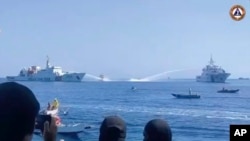The air forces of the Philippines and the United States held joint patrols over the South China Sea on Tuesday, a move that angered China, which also conducted a "routine patrol" over a disputed shoal.
The Philippines and the United States have ramped up security arrangements under President Ferdinand Marcos Jr. against a backdrop of rising tension between Manila and Beijing stemming from overlapping claims in the busy waterway.
The one-day exercise by the treaty allies took place in the West Philippine Sea, Philippine air force spokesperson Maria Consuelo Castillo said, using Manila's term for waters in the South China Sea that fall within its exclusive economic zone.
"The exercise aimed to enhance operational coordination, improve air domain awareness, and reinforce agile combat employment capabilities between the two air forces," Castillo said in a statement.
Castillo said three Philippine FA-50 fighter aircraft and two U.S. B1-B bombers participated in the exercise, which included flying over Scarborough Shoal, where the Chinese air force also carried out what it called a routine patrol.
In a statement on Tuesday, China's military accused the Philippines of joining patrols it said were organized by foreign countries to "undermine peace and stability in the South China Sea."
China's air force units would maintain a "high degree of alert, resolutely defend China's territorial sovereignty and maritime rights and interests, and control any military activities that disrupt the South China Sea," the Southern Theatre Command added.
China claims almost all the strategic waterway, a conduit for $3 trillion in annual commerce, despite overlapping claims by Indonesia, Malaysia, the Philippines and Vietnam.
At a briefing on Tuesday, the Philippine navy said it was "closely monitoring" three Chinese navy vessels within Manila's maritime zones, including a Jiangkai-class guided missile frigate.
"The presence of People's Liberation Army-Navy reflects the People's Republic of China's complete disregard for international law and undermines the peace and stability in the region," said navy spokesperson John Percie Alcos.
On Monday, state news agency Xinhua said the passage of the Chinese fleet was consistent with international law, quoting a spokesperson of the PLA's Southern Theater Command.
An international arbitration tribunal ruled in 2016 that China's claims, based on its historic maps, have no basis under international law, but Beijing does not recognize the decision.





